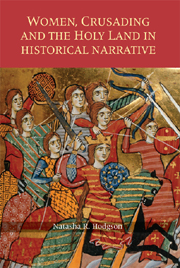Book contents
- Frontmatter
- Contents
- In memoriam Paul Ivison, a fellow enthusiast
- General Editor's Preface
- Acknowledgements
- Abbreviations
- Maps
- Genealogical Tables
- Introduction
- PART I
- 1 Literary Context
- 2 Authorship
- 3 Women in the History of Crusading and the Latin East
- PART II
- Conclusion
- Bibliography
- Index
- Warfare in History
1 - Literary Context
from PART I
Published online by Cambridge University Press: 12 September 2012
- Frontmatter
- Contents
- In memoriam Paul Ivison, a fellow enthusiast
- General Editor's Preface
- Acknowledgements
- Abbreviations
- Maps
- Genealogical Tables
- Introduction
- PART I
- 1 Literary Context
- 2 Authorship
- 3 Women in the History of Crusading and the Latin East
- PART II
- Conclusion
- Bibliography
- Index
- Warfare in History
Summary
THIS study is based upon historical narratives of the crusades and the Latin East and therefore it is necessary to provide a ‘working definition’ of what these entail. As well as narratives, a wide variety of relevant charters, letters and legal records survive from Europe and the Levant. Ecclesiastical records, Greek, Syriac, Hebrew and Arabic sources, and considerable architectural and archaeological data are also available to the historian of crusade and settlement. These forms of evidence provide a great wealth of historical data, but narratives provide a ‘precise framework’ which is perhaps better suited to ‘types of history which are less event-centred, such as the study of social change, thought, and cultural patterns’. It would be hard to postulate any coherent picture of the social and cultural impact of crusading without those authors who chose to interpret the events of crusade and settlement in a narrative format for posterity. The umbrella term ‘crusade narratives’, however, encompasses texts with divergent political, geographical and literary influences which varied considerably over the 200-year period in which crusading was at its height. Allowing for generic overlap and the pitfalls of categorisation, they can be roughly divided into chronicles, gesta, historiae, genealogies, annals and hagiographical works. Histories were also written in epistolary form in order to impart news of crusading events, such as the Lisbon Letter, De expugnatione Lyxbonensi, or the letters of Stephen of Blois to his wife, Adela.
- Type
- Chapter
- Information
- Publisher: Boydell & BrewerPrint publication year: 2007



